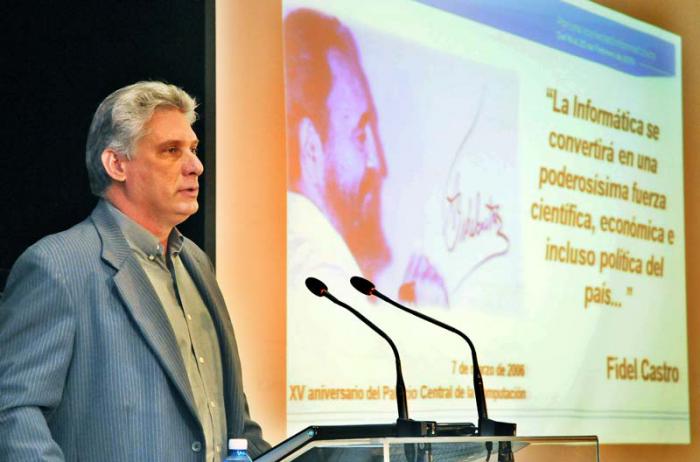Reflections On 10 years of the First National Workshop on Computerization and Cybersecurity
especiales

Between February 18-20, 2015, the First National Workshop on Computerization and Cybersecurity was held in Havana, Cuba, bringing together more than 11,500 Information and Communication Technology (ICT) professionals from all over the country in person and virtually, and more than 73,000 Internet users who participated in a discussion forum where concerns and expectations regarding these topics were expressed. Users of digital social networks also gave their opinions on the topics discussed.
Computerization, defined by the current First Secretary of the Central Committee of the Party and President of the Republic, Miguel Díaz-Canel Bermúdez, at the closing of the event, as "a complex, challenging, necessary process, which has to be addressed in a multi- and interdisciplinary manner, with a vision of the country and with institutional and citizen participation, which must cover all the scenarios and areas of the political, economic and social life of the country, and constitute an essential support and backing for the comprehensive improvement of our socialist, prosperous and sustainable society", has shown a dynamic of growth in the last 10 years despite the intensification of the U.S. blockade and the effects generated by the economic crisis at the international and national level, which have limited in the last three years the investments in the country's telecommunications network and access to technologies, developments and computer applications necessary to advance in this field.
During the workshop, problems were recognized that have had a positive transformation throughout this decade: absence of a computerization policy in Cuban society and the legal norms that implement it, dispersion of human resources linked to ICT, occurrence of criminalities, access limitations in institutions, technological dependence, insufficient dynamics of development of digital services and content, in the capacity of national data centers, education in and about Internet, management and access to knowledge and comprehensive general culture on the Internet, in the use of free and open source standards and online participation in matters of public interest, among others.
The First National Workshop on Computerization and Cybersecurity represented a milestone from the conceptual point of view, and in the guidelines it outlined, in the purpose of guaranteeing in our country the safe and wide use of the Internet in an inclusive manner based on the development of the country. Let’s just remember some ideas expressed by Miguel Díaz-Canel Bermúdez at the closing ceremony to assess the scope of its predictions.

[…] An issue like this cannot be seen as disconnected from the rest of the major issues the country is facing, and there’s the will and effective disposition of the Cuban Party and Government to develop the computerization of society and put Internet at the service of all, facilitating an effective and authentic insertion of Cubans in that space.
[…] We must understand that right and responsibility will coexist. There’s a responsibility on behalf of the State and society to make this effective, but it also supposes coexistence with other fundamental rights: the right to information, communication, participation, social accountability, together with individual and collective responsibility.
[…] The right to the Internet is therefore accompanied by the duties of the citizen and of organizations and institutions towards society. It’s therefore totally responsible to recognize that everyone's right to the Internet implies duties in relation to its appropriate use and in accordance with the law, and also implies the responsibility to ensure the defense of the country and its integrity.
[…] the Internet must be a tool at the service of the country's sustainable human development and its effective insertion into the performance of nations.
[…] It’s the fundamental problems of society, its economic, social and cultural challenges that must be at the center of the strategy and demand its creative and intensive use.
[…] The development of science is inconceivable today without the Internet, and the participation of our scientists in the main streams of science is mediated by the ability to access quality Internet. The Internet access strategy must be designed, developed, and implemented on the basis of the broadest participation and to contribute to and enhance sustainable human development […].
During this period, public Wi-Fi sites were enabled for access to Internet (2015), the Nauta Hogar service (2017), which allowed connection from homes, access to Internet via mobile (2018), access to 4G networks for prepaid customers (2019), 100% national digitalization was achieved (2019), the Transfermóvil (2015) and EnZona (2019) payment gateways emerged and the Cuban Union of Computer Scientists was founded (2016).
Telecommunications services have been extended to the most remote places in the Cuban geography, a sign of the inclusive policy of the revolutionary government. More than 55 thousand institutional connectivity links have been enabled. Polyclinics, hospitals, pharmacies, universities and faculties of Medical Sciences have had a priority in the connectivity and computerization of their processes; likewise, in the sectors of education, agriculture, tourism, transportation, energy, commerce and in the judicial system; the international connectivity bandwidth has grown more than 40 times in the last 10 years.
There are several institutions that have developed software and applications for various productive and service entities and tools have been implemented for the use of data analysis techniques, such as mobility and the platform for the analysis of large volumes of data and their application in strategic sectors.
In May 2024, the policy for Digital Transformation and the Cuban Digital Agenda was approved, a higher stage than the computerization of society, which will allow for greater culture and participation of the population in the use of ICT.
Cuba already has a Strategy for the development of Artificial Intelligence, with potential for its practical application in the productive, service and education sectors.
As a forum member said in the framework of the First National Workshop on Computerization and Cybersecurity, there are still many things to be resolved and changed, but progress is being made in the computerization of society, which is the right direction.
Translated by Amilkal Labañino / CubaSí Translation Staff













Add new comment